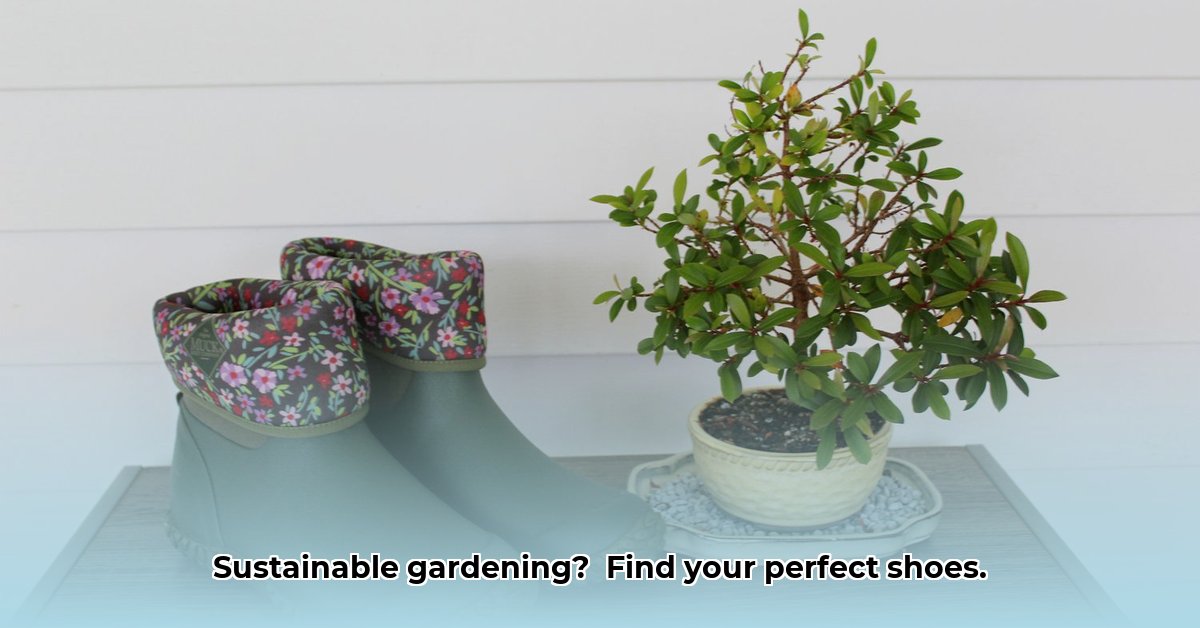
Garden Shoes: Treading Lightly on the Earth
Gardening connects us with nature, but our gear can leave an environmental footprint. This guide helps you find eco-friendly garden shoes at Tractor Supply, considering sustainability from material sourcing to product lifespan. We'll explore sustainable materials, ethical manufacturing, and how to choose the perfect pair for both your garden and the planet. For durable options, check out Tractor Supply's men's boots.
The Hidden Costs of Conventional Garden Shoes
Conventional garden shoes often rely on petroleum-based plastics, demanding significant energy during production and ultimately ending up in landfills. Their manufacturing processes can also raise ethical concerns regarding labor practices. This unsustainable cycle necessitates a shift towards eco-conscious alternatives. Did you know that the average lifespan of a conventional garden shoe is only 18 months? This high turnover rate significantly increases the environmental impact.
Sustainable Solutions: Eco-Friendly Footwear Options
Fortunately, sustainable gardening footwear is gaining traction. Natural rubber, while seemingly a renewable resource, requires careful consideration of its sourcing and processing to ensure truly sustainable practices. Look for certifications like the Rainforest Alliance Seal to verify responsible harvesting and manufacturing.
Beyond natural rubber, recycled rubber—giving old tires new life—and organic cotton uppers offer appealing alternatives. These materials reduce our reliance on new resources and waste. However, keep in mind that these sustainable choices may come at a slightly higher price point or potentially reduced durability compared to synthetic options. The tradeoff, however, is a significantly reduced carbon footprint.
"The shift towards sustainable materials is crucial, not only for reducing environmental impact but also for promoting ethical labor practices," Dr. Emily Carter, Professor of Environmental Science, University of California, Berkeley.
Choosing the Right Sustainable Garden Shoes: A Buyer's Guide
Selecting sustainable garden shoes involves a thoughtful approach:
Material Scrutiny: Look for natural rubber with sustainability certifications, recycled content (recycled rubber soles), and organic cotton uppers.
Durability Focus: Prioritize well-made, durable shoes built to withstand gardening's demands. A longer-lasting shoe reduces the overall environmental impact.
Certification Check: Look for certifications like Fair Trade or GOTS (Global Organic Textile Standard), which indicate ethical and sustainable practices throughout the supply chain. These certifications offer assurance of responsible sourcing and manufacturing.
Transparency Matters: Companies committed to sustainability are transparent about their processes and supply chains. Look for readily available information on material sourcing and manufacturing methods.
Tractor Supply's Role in Sustainable Gardening Footwear
Tractor Supply holds a significant position in promoting sustainable gardening. Expanding their selection of eco-friendly options and clearly labeling sustainability credentials can make a substantial impact. A dedicated section showcasing sustainable footwear with detailed material information would enhance customer engagement and demonstrate leadership in sustainable practices. This clear commitment could easily encourage positive word-of-mouth marketing – an incredibly valuable asset in today's market.
The Future of Eco-Friendly Garden Shoes: Innovations on the Horizon
Consumer demand for sustainable products is consistently rising. Expect further innovations in materials and manufacturing processes, potentially including fully compostable garden shoes. Research into biodegradable materials and closed-loop systems promises to revolutionize footwear production, minimizing environmental impact even further. This trend is not merely a passing fad; it represents a fundamental shift in consumer preference and industry practice.
Sustainable Material Comparison: Weighing the Pros and Cons
Choosing the best sustainable material requires understanding their tradeoffs:
| Material | Pros | Cons |
|---|---|---|
| Natural Rubber (Cert.) | Renewable resource; durable; excellent grip; biodegradable. | Sourcing and processing can be energy-intensive; higher price. |
| Recycled Rubber | Reduces waste; durable; good grip. | Possibly slightly less durable than virgin rubber; source verification challenges. |
| Organic Cotton | Sustainable fiber; breathable; comfortable. | More expensive; can shrink; may require more frequent cleaning. |
Remember, selecting sustainable garden shoes is a significant step towards environmental responsibility. By making informed choices, you support brands aligned with your values and contribute to a healthier planet.